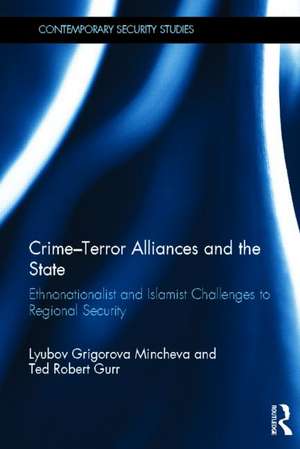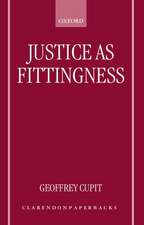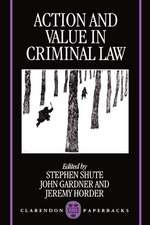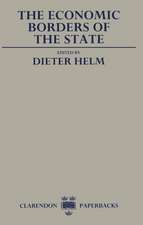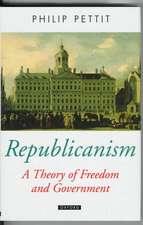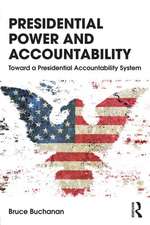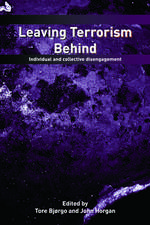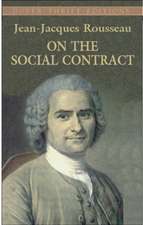Crime-Terror Alliances and the State: Ethnonationalist and Islamist Challenges to Regional Security: Contemporary Security Studies
Autor Lyubov Mincheva, Ted Robert Gurren Limba Engleză Hardback – 7 dec 2012
"Unholy alliances" is a term used to describe hybrid trans-border militant and criminal networks that pose serious threats to security in Europe and elsewhere. Identity networks provide the basis for militant organizations using violent strategies – insurgency and terrorism – for political objectives. To gain funds and weapons militant networks may establish criminal enterprises, or align with existing trans-border criminal and financial networks.
This book extends the concept of unholy alliances to include the trans-state criminal syndicates that arise in failed and dysfunctional states, exemplified by Serbia and Bulgaria during their post-Communist transitions. To deal with this complex and unconventional subject, the authors develop a theoretical framework that looks at four kinds of factors conditioning the interaction between the political and the criminal: trans-state identity networks, armed conflict, the balance of market opportunities and constraints, and the role of unstable and corrupt states. The volume also examines actors at two levels of analysis: the structure and activities of militant (and/or criminal) networks, and the policies of state actors that shape and reshape the interaction of opportunities and constraints.
This book will be of much interest to students of terrorism, insurgency, transnational crime, war and conflict studies, and IR in general.
Din seria Contemporary Security Studies
-
 Preț: 312.00 lei
Preț: 312.00 lei -
 Preț: 348.40 lei
Preț: 348.40 lei - 9%
 Preț: 934.96 lei
Preț: 934.96 lei -
 Preț: 287.96 lei
Preț: 287.96 lei - 18%
 Preț: 1222.16 lei
Preț: 1222.16 lei - 18%
 Preț: 1227.03 lei
Preț: 1227.03 lei -
 Preț: 452.35 lei
Preț: 452.35 lei - 18%
 Preț: 1108.42 lei
Preț: 1108.42 lei - 20%
 Preț: 248.97 lei
Preț: 248.97 lei - 18%
 Preț: 1218.89 lei
Preț: 1218.89 lei - 18%
 Preț: 1058.79 lei
Preț: 1058.79 lei -
 Preț: 498.48 lei
Preț: 498.48 lei - 28%
 Preț: 1016.77 lei
Preț: 1016.77 lei - 18%
 Preț: 1062.98 lei
Preț: 1062.98 lei - 18%
 Preț: 1010.05 lei
Preț: 1010.05 lei - 18%
 Preț: 1054.97 lei
Preț: 1054.97 lei -
 Preț: 399.79 lei
Preț: 399.79 lei - 18%
 Preț: 1114.30 lei
Preț: 1114.30 lei - 18%
 Preț: 1113.25 lei
Preț: 1113.25 lei - 18%
 Preț: 1221.26 lei
Preț: 1221.26 lei - 18%
 Preț: 1059.84 lei
Preț: 1059.84 lei - 18%
 Preț: 704.41 lei
Preț: 704.41 lei - 18%
 Preț: 1055.84 lei
Preț: 1055.84 lei - 28%
 Preț: 821.10 lei
Preț: 821.10 lei - 18%
 Preț: 1061.06 lei
Preț: 1061.06 lei - 18%
 Preț: 1229.46 lei
Preț: 1229.46 lei -
 Preț: 385.54 lei
Preț: 385.54 lei - 18%
 Preț: 946.61 lei
Preț: 946.61 lei - 18%
 Preț: 1271.75 lei
Preț: 1271.75 lei - 18%
 Preț: 1057.57 lei
Preț: 1057.57 lei -
 Preț: 416.22 lei
Preț: 416.22 lei -
 Preț: 437.71 lei
Preț: 437.71 lei - 18%
 Preț: 1054.71 lei
Preț: 1054.71 lei -
 Preț: 409.31 lei
Preț: 409.31 lei - 18%
 Preț: 1170.14 lei
Preț: 1170.14 lei - 28%
 Preț: 849.84 lei
Preț: 849.84 lei - 18%
 Preț: 702.40 lei
Preț: 702.40 lei -
 Preț: 414.32 lei
Preț: 414.32 lei - 18%
 Preț: 1059.93 lei
Preț: 1059.93 lei - 18%
 Preț: 1061.93 lei
Preț: 1061.93 lei - 18%
 Preț: 1163.88 lei
Preț: 1163.88 lei - 18%
 Preț: 1002.68 lei
Preț: 1002.68 lei - 18%
 Preț: 694.94 lei
Preț: 694.94 lei - 25%
 Preț: 823.63 lei
Preț: 823.63 lei - 18%
 Preț: 939.79 lei
Preț: 939.79 lei - 18%
 Preț: 1057.89 lei
Preț: 1057.89 lei
Preț: 850.91 lei
Preț vechi: 1180.01 lei
-28% Nou
Puncte Express: 1276
Preț estimativ în valută:
162.82€ • 177.42$ • 137.20£
162.82€ • 177.42$ • 137.20£
Carte tipărită la comandă
Livrare economică 23 aprilie-07 mai
Preluare comenzi: 021 569.72.76
Specificații
ISBN-13: 9780415506489
ISBN-10: 0415506484
Pagini: 256
Ilustrații: 5 tables and 4 line drawings
Dimensiuni: 156 x 234 x 18 mm
Greutate: 0.63 kg
Ediția:New.
Editura: Taylor & Francis
Colecția Routledge
Seria Contemporary Security Studies
Locul publicării:Oxford, United Kingdom
ISBN-10: 0415506484
Pagini: 256
Ilustrații: 5 tables and 4 line drawings
Dimensiuni: 156 x 234 x 18 mm
Greutate: 0.63 kg
Ediția:New.
Editura: Taylor & Francis
Colecția Routledge
Seria Contemporary Security Studies
Locul publicării:Oxford, United Kingdom
Public țintă
Postgraduate, Professional, and UndergraduateCuprins
1. Unholy Alliances: A Theoretical Framework for Analyzing Trans-Border Crime-Terror Networks 2. Crime, Political Violence and Governance in Kosovo: A Triple Alliance? 3. Kurdish Nationalists and Criminal Networks: The PKK in Turkey, the Middle East, and Europe 4. Militant Islam and Bosnia’s Civil War 1991-1995 5. Greed, Grievance and Political Islam in the Algerian Revolutionary War of the 1990s 6. Serbia in the 1990s: Militant Nationalism and the Criminalized State 7. The State and Crime Syndicates in Post-Communist Bulgaria 8. Militants and Money: The Political Economy of Communal Rebels in Post-Communist Europe and the Middle East 9. Unholy Alliances: Responding to Ethnonational and Islamist Crime-Terror Networks
Notă biografică
Lyubov Grigorova Mincheva is Associate Professor of Political Science at
the University of Sofia, Bulgaria. She earned her Ph.D. from the University of
Maryland and has published extensively in English and Bulgarian languages on
ethnopolitics, spillover crisis, peacekeeping, crime, and terrorism. She is a member
of the European Standing Group in International Relations.
Ted Robert Gurr is Distinguished University Professor, Emeritus, at the University
of Maryland, USA. He founded and consults on the Minorities at Risk project at the
University’s Center for International Development and Conflict Management.
Among his books are Why Men Rebel, Violence in America, and Peoples vs. States. He also established and coedits the biennial global report Peace and Conflict.
the University of Sofia, Bulgaria. She earned her Ph.D. from the University of
Maryland and has published extensively in English and Bulgarian languages on
ethnopolitics, spillover crisis, peacekeeping, crime, and terrorism. She is a member
of the European Standing Group in International Relations.
Ted Robert Gurr is Distinguished University Professor, Emeritus, at the University
of Maryland, USA. He founded and consults on the Minorities at Risk project at the
University’s Center for International Development and Conflict Management.
Among his books are Why Men Rebel, Violence in America, and Peoples vs. States. He also established and coedits the biennial global report Peace and Conflict.
Recenzii
"Both criminologist and political scientists have found it difficult to find adequate conceptual tools to address political crime and criminal politics. Here then, at long last, is a study that provides a sophisticated theoretical framework and new conceptual tools to understand the complex interaction between kleptocratic public officials, trans-border organized crime syndicates and identity-based international terrorist networks. It has been said that nothing is as practical as a good theory. In this sense, this path-breaking volume with its six in-depth case studies should be an eye-opener for national law enforcement agencies as well as Europol and Interpol." – Alex P. Schmid, Editor, Perspectives on Terrorism & Fellow, International Centre for Counter-Terrorism
"This pathbreaking book by Gurr and Mincheva addresses one of the issues that transcends traditional academic disciplines-- cross-border networks of criminals and terrorists. With rich case study material from the Balkans, the Middle East, and North Africa, the authors explore the intersection of organized crime and terrorism with stunning insight. The book is a must read for scholars of organized crime, terrorism, and money laundering, regardless of the disciplines with which they identify."- Peter Grabosky, Australian National University
"The academic disciplines of political science and criminology have long kept political and criminal issues in artificially isolated silos. Mincheva and Gurr break through these silos by examining the violent intersection of organized crime and terrorism. Using six carefully selected case studies they scrutinize the trans-border militant and criminal networks that currently pose a major security threat to many parts of the world. The result is an important look at how politics and crime sometimes bleed into each other."- Gary LaFree, University of Maryland, USA
"Moving beyond high-sticking and charging the mound, Kevin Young's Sport, Violence and Society challenges the existing theoretical framework of violence in sports, arguing for an interpretation of violence in sport that includes not only violent acts committed on the field, but acts of violence that are intimately tied to sport, such as damage to the environment resulting from sporting activities. The sheer number of questions and topics raised in the course of this reimagining of the field as well as the plethora of sources used will make Sports, Violence and Society an important source for scholars of violence interested in broadening the horizons of the study of violence."–Sam Bieler, Urban Institute USA
"This book is a "must read" for specialists in organized crime and terrorism. In addition, it should be of particular interest to those who study state crime. When criminal insurgents rise to power, they often remain close to their old comares, and retain some of their old habits. The book will especially interest European scholars, given the fact that each of the criminal/political networks under analysis operates on the periphery of Western Europe. The implication of European regional security are self evident."–Peter Grabosky, Australian National University
'This book is a "must read" for specialists in organized crime and terrorism. In addition, it should be of particular interest to those who study state crime' - Peter Grabosky, Australian National University
"This pathbreaking book by Gurr and Mincheva addresses one of the issues that transcends traditional academic disciplines-- cross-border networks of criminals and terrorists. With rich case study material from the Balkans, the Middle East, and North Africa, the authors explore the intersection of organized crime and terrorism with stunning insight. The book is a must read for scholars of organized crime, terrorism, and money laundering, regardless of the disciplines with which they identify."- Peter Grabosky, Australian National University
"The academic disciplines of political science and criminology have long kept political and criminal issues in artificially isolated silos. Mincheva and Gurr break through these silos by examining the violent intersection of organized crime and terrorism. Using six carefully selected case studies they scrutinize the trans-border militant and criminal networks that currently pose a major security threat to many parts of the world. The result is an important look at how politics and crime sometimes bleed into each other."- Gary LaFree, University of Maryland, USA
"Moving beyond high-sticking and charging the mound, Kevin Young's Sport, Violence and Society challenges the existing theoretical framework of violence in sports, arguing for an interpretation of violence in sport that includes not only violent acts committed on the field, but acts of violence that are intimately tied to sport, such as damage to the environment resulting from sporting activities. The sheer number of questions and topics raised in the course of this reimagining of the field as well as the plethora of sources used will make Sports, Violence and Society an important source for scholars of violence interested in broadening the horizons of the study of violence."–Sam Bieler, Urban Institute USA
"This book is a "must read" for specialists in organized crime and terrorism. In addition, it should be of particular interest to those who study state crime. When criminal insurgents rise to power, they often remain close to their old comares, and retain some of their old habits. The book will especially interest European scholars, given the fact that each of the criminal/political networks under analysis operates on the periphery of Western Europe. The implication of European regional security are self evident."–Peter Grabosky, Australian National University
'This book is a "must read" for specialists in organized crime and terrorism. In addition, it should be of particular interest to those who study state crime' - Peter Grabosky, Australian National University
Descriere
This book examines the trans-border connections between militant and criminal networks and the relationship between these and the states in which they operate.
